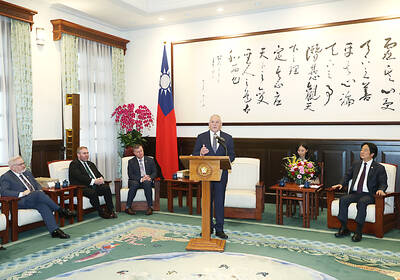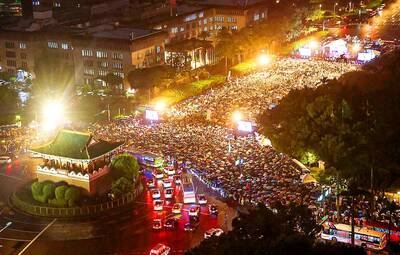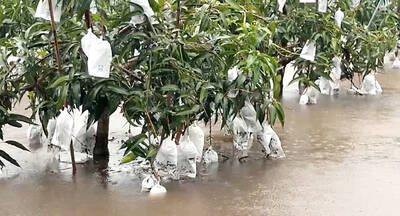A university yesterday said it had developed energy-saving LED lamps that could cut costs for fishermen who use bright lights on their boats to attract fish.
“LED lamps can help reduce overall fuel consumption on fishing boats by between 15 and 20 percent,” National Cheng Kung University professor Shen Sheng-chih (沈聖智), who helped develop the device, said at a press conference.
The LED lamps use less than 10 percent of the power required by traditional fishing lamps, allowing more energy to be diverted to freezers to ensure catches remain fresh, Shen said.
Many fishermen turn off their freezers to save power while running traditional lamps, he said.
Shen and Fang Ming-chung (方銘川), both professors from the university’s Department of Systems and Naval Mechatronic Engineering, developed the lamp over a five year period with NT$20 million (US$669,000) in funding from the Council of Agriculture.
The lamp was also designed to project patterns of light on the surface of the ocean to attract fish, Shen said, adding that the LED lamp is the first device in the world to be designed with this function.
Shen said the lamp’s unique light patterns entice fish to remain longer in lit areas, adding that the LED lamp would dispel the myth that the brighter the light, the better the catch.
The professor added that the LED lamp is safer for fishermen, who are often exposed to hazardous ultraviolet rays emitted by traditional fishing lamps.
Over the past three years, the LED lamp has been used in test runs on a number of Taiwanese fishing vessels and test results have shown that fuel costs can be cut by about NT$300,000 a year for offshore vessels and by more than NT$2 million per four-month voyage for open-ocean vessels, Shen said.
If all fishing vessels in the country used the LED lamp, fishermen could save a total of between NT$600 million and NT$700 million in fuel costs each year, the study found.
Shen added that the LED lamp can easily be switched on and off, “unlike traditional lamps, which cannot be turned on for up to 20 minutes after being switched off.”
He said that this function allows fishermen to have better control over when they catch fish.
The results of the study have been given to two local manufacturers and Japanese companies have also expressed interest in the technology, as similar lamps in Japan may be 10 times more expensive, Fang said.

‘NON-RED’: Taiwan and Ireland should work together to foster a values-driven, democratic economic system, leveraging their complementary industries, Lai said President William Lai (賴清德) yesterday expressed hopes for closer ties between Taiwan and Ireland, and that both countries could collaborate to create a values-driven, democracy-centered economic system. He made the remarks while meeting with an Irish cross-party parliamentary delegation visiting Taiwan. The delegation, led by John McGuinness, deputy speaker of the Irish house of representatives, known as the Dail, includes Irish lawmakers Malcolm Byrne, Barry Ward, Ken O’Flynn and Teresa Costello. McGuinness, who chairs the Ireland-Taiwan Parliamentary Friendship Association, is a friend of Taiwan, and under his leadership, the association’s influence has grown over the past few years, Lai said. Ireland is

A saleswoman, surnamed Chen (陳), earlier this month was handed an 18-month prison term for embezzling more than 2,000 pairs of shoes while working at a department store in Tainan. The Tainan District Court convicted Chen of embezzlement in a ruling on July 7, sentencing her to prison for illegally profiting NT$7.32 million (US$248,929) at the expense of her employer. Chen was also given the opportunity to reach a financial settlement, but she declined. Chen was responsible for the sales counter of Nike shoes at Tainan’s Shinkong Mitsukoshi Zhongshan branch, where she had been employed since October 2019. She had previously worked

FINAL COUNTDOWN: About 50,000 attended a pro-recall rally yesterday, while the KMT and the TPP plan to rally against the recall votes today Democracy activists, together with arts and education representatives, yesterday organized a motorcade, while thousands gathered on Ketagalan Boulevard in Taipei in the evening in support of tomorrow’s recall votes. Recall votes for 24 Chinese Nationalist Party (KMT) lawmakers and suspended Hsinchu City mayor Ann Kao (高虹安) are to be held tomorrow, while recall votes for seven other KMT lawmakers are scheduled for Aug. 23. The afternoon motorcade was led by the Spring Breeze Culture and Arts Foundation, the Tyzen Hsiao Foundation and the Friends of Lee Teng-hui Association, and was joined by delegates from the Taiwan Statebuilding Party and the Taiwan Solidarity

TRANSPORT DISRUPTION: More than 100 ferry services were suspended due to rough seas and strong winds, and eight domestic flights were canceled, the ministry said Tropical Storm Wipha intensified slightly yesterday as it passed closest to Taiwan, dumping more than 200mm of rain in Hualien and Taitung counties, the Central Weather Administration (CWA) said. As of 11am, Wipha was about 210km southwest of Cape Oluanpi (鵝鑾鼻) and was moving west-northwest at 27km per hour (kph). The storm carried maximum sustained winds of 101kph and gusts reaching 126kph, with a 150km radius of strong winds, CWA data showed. Wipha’s outer rainbands began sweeping across Taiwan early yesterday, delivering steady rainfall in the east and scattered showers in other regions, forecasters said. More heavy rain was expected, especially in the eastern